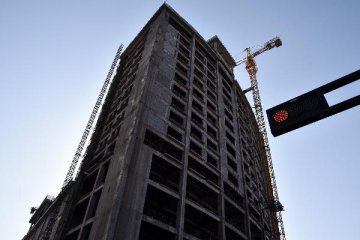
Following tougher house-buying rules to contain speculation, property sales in China's large cities dropped at the beginning of 2017.
Analysts said house prices nationwide could drop slightly this year as more tightening measures were in the pipeline.
According to Wind Information, a Shanghai-based financial data and information provider, property sales in Beijing, Shanghai, Guangzhou and Shenzhen declined 22 percent month on month and 5 percent year on year in the first week of 2017.
As of Jan. 12, supply and transaction volumes for residential land both dropped nationwide. Transaction volumes in 100 large and medium-sized cities declined 83.8 percent from a month earlier, and there was no new land supply in first-tier cities, data showed "Property sales fell due to measures aimed at curbing real estate prices," said Wen Yang, an analyst with Minsheng Securities.
A GF Securities report said that the new year holidays and the high base of year-end statistics had caused the fall. "The relationship between demographics and house prices remains important. In the long run, property prices may not look that good," said Li Xunlei, chief economist of Zhongtai Securities.
Li said he expected negative house price growth in 2017 due to slowing real estate investment.
The Central Economic Work Conference at the end of last year set the tone for the real estate market in 2017: stable and healthy development. "Houses are built to be lived in, not for speculation," said a statement issued after the conference.
The country will establish a market-oriented long-term mechanism that can curb a real estate bubble and prevent erratic fluctuations. The government will use land, investment, lawmaking, fiscal and taxation and financial instruments in order to achieve its aim, according to the statement.
Land supply should be increased reasonably in cities with strong pressure from rising prices, while de-stocking efforts in third and fourth-tier cities should be stressed, the statement said.
Credit policy at the micro level should support the reasonable purchase of houses as residences and tightly restrict credit in speculation, according to the statement.
Since last October dozens of Chinese cities have announced measures, including purchase limits and tightened mortgage restrictions, to prevent prices from rising out of control.
The latest round of property restrictions came after two years of progressive policy easing, starting with the relaxation of purchase restrictions in 2014. The momentum was further fueled by the government's pro-growth policies, including interest rate cuts and lower deposit requirements.
The sector's recovery has been uneven from city to city, with economically strong areas reporting drastic price rises, and less developed areas still reporting huge inventories of unsold houses.
"The government will likely scale up efforts to continue differentiated property policies to address market divergence between top-tier cities and smaller ones," Wen said. Wen said he expected a slow decline of house prices this year as sales would wobble.
"Judging from previous experience, tightening measures will have a negative impact on transactions, so this year we may see both transaction and price decline," said Le Jiadong, an analyst with GF Securities. Industry insiders also forecast price falls.
Hu Jinghui, vice president of leading real estate agency 5i5j, said Beijing's second-hand residential property sales and prices would both likely fall this year.





















Latest comments